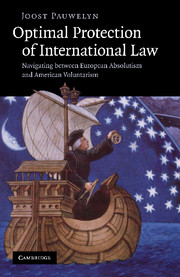 Optimal Protection of International Law
Optimal Protection of International Law Book contents
- Frontmatter
- Contents
- Table of cases
- Table of treaties
- Table of international documents
- Acknowledgments
- Abbreviations
- Foreword
- Introduction
- 1 Overview and relevance of the analysis
- 2 The two extremes of European absolutism and American voluntarism
- 3 Allocation, protection and back-up enforcement of entitlements
- 4 How should international law entitlements be protected?
- 5 How are international law entitlements currently protected?
- 6 Back-up enforcement in international law
- 7 Conclusion
- References
- Index
4 - How should international law entitlements be protected?
Published online by Cambridge University Press: 07 July 2009
- Frontmatter
- Contents
- Table of cases
- Table of treaties
- Table of international documents
- Acknowledgments
- Abbreviations
- Foreword
- Introduction
- 1 Overview and relevance of the analysis
- 2 The two extremes of European absolutism and American voluntarism
- 3 Allocation, protection and back-up enforcement of entitlements
- 4 How should international law entitlements be protected?
- 5 How are international law entitlements currently protected?
- 6 Back-up enforcement in international law
- 7 Conclusion
- References
- Index
Summary
This chapter tackles the core normative question of how international entitlements ought to be protected under the second prong of this book's three-pronged framework (allocation, protection, back-up enforcement). It first explains why in domestic law, and also in international law, property protection should be the default form of protection of entitlements unless special circumstances arise (section 1). As a result, what I have called European absolutism (in favor of hard inalienability) and American voluntarism (in favor of simple liability protection) are both undesirable extremes. Subsequently, I describe the circumstances in which deviation from the default rule of property protection may be advisable, first toward stronger protection of entitlements as inalienable (section 2), second toward weaker protection of entitlements under a liability rule (section 3). Yet, for both types of deviation from the default rule of property protection, I discuss a number of important caveats: section 4 sums up elements that, where present in, for example, a specific treaty context, favor weaker protection of international law; section 5, in contrast, offers features that militate for stronger protection of international law. Chapter 4 concludes with a matrix that summarizes the criteria that treaty negotiators should consider when selecting the optimal level of protection for a new treaty or other rule of international law. Chapter 5 tests these normative predictions to the current state of protection of international law entitlements.
- Type
- Chapter
- Information
- Optimal Protection of International LawNavigating between European Absolutism and American Voluntarism, pp. 45 - 106Publisher: Cambridge University PressPrint publication year: 2008


